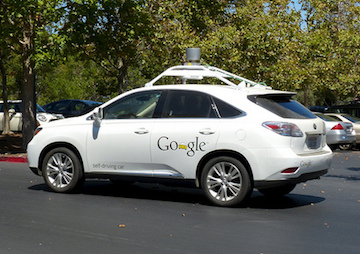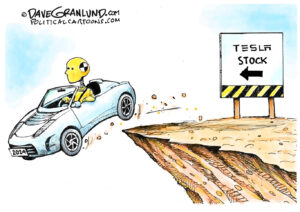Questions of Morality and Safety Are Steering the Future of Self-Driving Cars
The so-called “trolley problem” isn’t the only issue on the horizon as the driverless car rolls toward the nation’s public roads. The so-called “trolley problem” isn’t the only issue on the horizon as the driverless car rolls toward the nation’s public roads. A prototype of Google's self-driving car, circa 2013. (Roman Boed / Flickr / CC-BY)
A prototype of Google's self-driving car, circa 2013. (Roman Boed / Flickr / CC-BY)
When drivers head to work or to the store, they subconsciously make hundreds of decisions related to driving laws and safety: Should they swerve to avoid an object in the road? Should they speed up to catch a yellow light? With driverless cars on the way, programmers are charged with figuring out how to replicate a human’s driving logic and anticipate what decisions a car should make in countless scenarios.
In terms of the morality of programming driverless cars, the biggest question has to do with what’s known as the “trolley problem.” This hypothetical scenario involves a runaway trolley speeding down a track on which five people are standing, while only one person is in the way on an adjacent track. Should the car switch tracks in order to kill fewer people? Should a car’s passenger be sacrificed to save several people outside of it? Driverless cars will have to be programmed to make decisions like this.
“There are two challenges when it comes to programming morality in cases that pose trade-offs between the lives of different people,” Iyad Rahwan, an associate professor at the Massachusetts Institute of Technology’s Media Lab, told Truthdig. “The technical challenge is how to create AI [artificial intelligence] algorithms that are capable of implementing whatever moral decision principle we give it,” he said. “The other challenge is figuring out what those moral values are in the first place.”
The psychology behind these morality decisions has to be studied, because the most moral thing to do may not be what’s best for the car to do in every case.
As it stands, researchers have not been able to program cars to flawlessly figure out the relevant morality problems. “The technology just isn’t there right now,” said Michael Clamann, a senior research scientist at Duke University’s Humans and Autonomy Lab. “What I think needs to happen first is, let’s see how much we can design the system so these questions don’t even come up in the first place.”
Clamann pointed out that it’s considered unacceptable when an industrial robot kills or injures a human, and the same should be true for driverless cars.
One major possibility with driverless cars is that lives could be saved by erasing human error in driving. More than 38,300 people were killed and 4.4 million injured in car accidents in 2015, and many of those deaths were attributed to human error. Driverless cars clearly can’t be distracted by texting or anxiety or the many other things that can cause people to make driving mistakes. Assuming it’s operating correctly, the number of deaths and injuries on the road could be reduced significantly.
“The greatest reason to support driverless cars is their potential to revolutionize transportation safety,” Rahwan said.
Elon Musk, CEO of Tesla Motors and founder of SpaceX, believes human driving will one day be outlawed because of the need to maintain road safety.
“I agree with Elon Musk that we may one day ban people from driving cars, except in designated spaces,” Rahwan said. “Of course, this is difficult for people to imagine now, and there would definitely be a backlash. But in the long term, we will get there, because it may potentially save millions of lives.”
People who enjoy driving will likely resist being barred from driving, but the benefit of fewer people dying on our roads may outweigh those concerns. That said, situations may arise in which a car has been hacked or simply isn’t operating properly, and so there could be a need to include the option for a car occupant to take over control.
“Google wants a car that doesn’t have a steering wheel or a pedal,” Clamann said. “You could want some kind of override.
“There are going to be situations where the autonomous vehicle is not going to know what to do,” he added. “At some point, we’re going to have these unique circumstances where the human is going to have to take over, and in those cases, it’s going to be a really challenging situation.”
But humans of the future may not even know how to drive. Once driverless cars become ubiquitous, learning to drive may not be seen as necessary. “Are they going to know what to do in that situation? Are they going to know how to drive or handle the car?” Clamann asked.
It’s still going to be a while before driverless cars are on the road exclusively. A University of Michigan study found that even when driverless cars are the only cars available for sale, it will take 15 years before they are the only vehicles filling our streets. Elon Musk has claimed it will only be a couple of years before autonomous vehicles are ready for sale, but Clamann believes that estimate may be overly optimistic.
Either way, it seems the mass introduction of these vehicles is not too far off. Hopefully, the development of safety measures won’t be rushed while companies compete to be the first out of the gates with a fully autonomous car.
For those still wondering whether driverless cars are a good idea, there’s one more aspect to consider, said Clamann: No more traffic tickets.
“If we get so far with autonomous vehicles that we’re doing away with traffic tickets, that means we’re also doing away with a lot of the injuries and fatalities that we have,” he said. “I think that’s a pretty fair trade-off.”
Your support matters…Independent journalism is under threat and overshadowed by heavily funded mainstream media.
You can help level the playing field. Become a member.
Your tax-deductible contribution keeps us digging beneath the headlines to give you thought-provoking, investigative reporting and analysis that unearths what's really happening- without compromise.
Give today to support our courageous, independent journalists.





